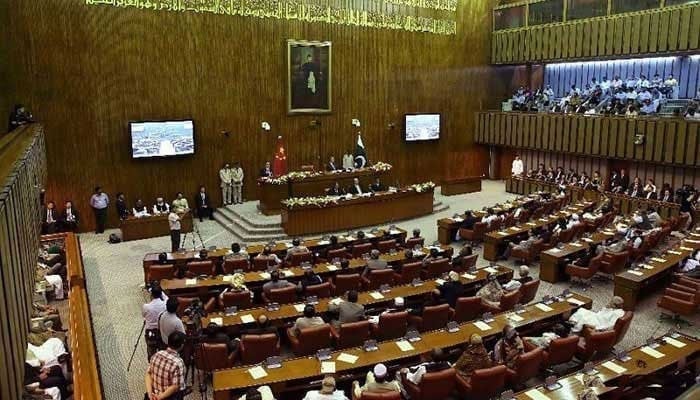Senate passes bill to abolish death penalty for publicly stripping woman off clothes
Talal Chaudhry says move aims to align country's policies with int'l obligations under GSP+ trade agreement with EU
July 19, 2025

- Move aims at aligning policies with GSP+ agreement with EU: Talal.
- Highlights need to limit capital punishment to most serious crimes.
- Proposed legislation replaces death penalty with life imprisonment.
ISLAMABAD: In a move aimed at ensuring the country's policies align with international obligations, the Senate has passed the Criminal Laws (Amendment) Bill, 2025 seeking to abolish the death penalty for harbouring hijackers and publicly stripping a woman off her clothes amid voice of concern and dissent from both sides of the divide, The News reported on Saturday.
The bill was moved in the House by Minister of State for Interior Talal Chaudhry to align with international obligations under the GSP+ trade agreement with the European Union (EU), requiring to limiting the capital punishment to the most serious crimes.
The proposed legislation suggests the replacement of the death penalty under Sections 354-A and 402-C of the PPC with life imprisonment, whereas Section 354-A in its present form reads, "whoever assaults or uses criminal force against any woman, strips her of her clothes, and exposes her in public shall be punished with death or life imprisonment, along with a fine".
The statement of objects and reasons of the bill notes under Article 6(2) of ICCPR, the death penalty can only be imposed for the "most serious crimes". The section reads, "in countries which have not abolished the death penalty, sentence of death may be imposed only for the most serious crimes in accordance with the law in force at the time of the commission of the crime and not contrary to the provisions of the present Covenant and to the Convention on the Prevention and Punishment of the Crime of Genocide. This penalty can only be carried out pursuant to a final judgement rendered by a competent court".
The statement also says in an effort to comply with the requirements of GSP and Pakistan's international commitments under ICCPR, three meetings with all stakeholders were held on 7-9-2021, 8-9-2021 and 10-9-2021 to review reduction of the death penalty in order to bring it in line with international law and Islamic jurisprudence. Ministry of Interior and Narcotics Control proposes draft Criminal Laws (Amendment) Bill, 2025 proposing omission of death penalty from Pakistan Penal Code 1860 with an alternative punishment of life imprisonment in sections 354 A, and 402 C.
Pakistan Tehreek-e-Insaf's (PTI) parliamentary leader in the Senate Barrister Syed All Zafar was on his feet to emphasise that the crime of stripping a woman of her clothes was as serious as murder and stressed that death penalty over this offence should remain unchanged.
Likewise, Senator Muhammad Abdul Qadir feared that if the death penalty for terrorism will also be abolished. Balochistan Awami Party's Samina Mumtaz Zehri noted that the laws for crimes against women should be made more stringent and warned that any leniency in the law would embolden criminals.
To substantiate her point, she also said the conviction rate was abysmally low due to weak prosecution and stressed that the focus should be on police and judicial reforms and feared: "This is not right. This is not going to help the country and the people". Responding to the members, Law Minister Azam Nazeer Tarar contended that the severity of the sentence cannot prevent crimes and further cited the example of Europe, where there was no death penalty and the crime rate was 2%.
He continued that in Pakistan, there was the death penalty for over a 100 offences. He added that the sentence on stripping a woman of her clothes was converted from seven years imprisonment to capital punishment in 1982 during the regime of General Zia ul Haq.
The Senate adopted the extradition amendment bill to remove procedural difficulties causing delay in processing extradition requests and the Pakistan Citizenship Act amendment bill to allow Pakistani diaspora to resume their Pakistani citizenship.
The law minister explained that extradition was always on a reciprocal basis and adequate safety valves were very much there.
On the Pakistan citizenship act amendment bill, he said that this would facilitate those who have to, at times, renounce Pakistan’s citizenship, but the deep love of the motherland compels them to get back citizenship. The House will now reassemble on Monday afternoon.











